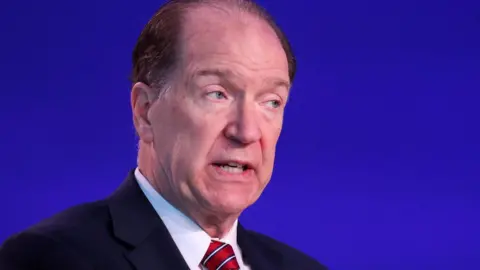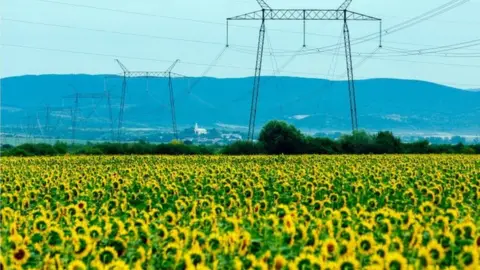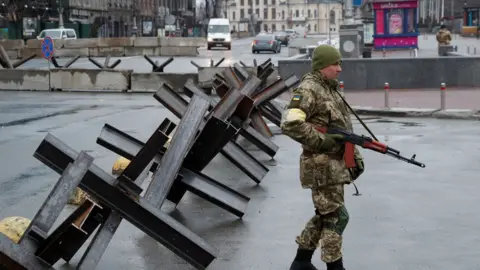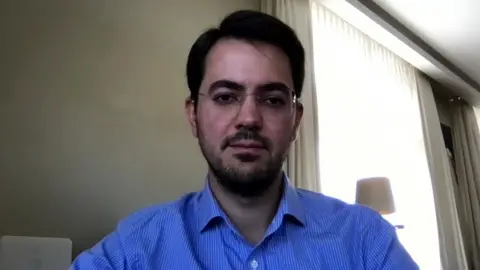Ukraine war is economic catastrophe, warns World Bank
 Reuters
ReutersThe war in Ukraine is "a catastrophe" for the world which will cut global economic growth, the president of the World Bank has told the BBC.
"The war in Ukraine comes at a bad time for the world because inflation was already rising," said David Malpass.
He stressed his biggest concern is "about the pure human loss of lives" that is occurring.
Thousands of civilians and soldiers are thought to have been killed by the fighting.
Mr Malpass said the economic impact of the war stretches beyond Ukraine's borders, and the rises in global energy prices in particular "hit the poor the most, as does inflation".
Food prices have also been pushed up by the war, and "are a very real consideration and problem for people in poor countries".
Food crunch
Mr Malpass points out that both Russia and Ukraine are big food producers. Ukraine is the world's biggest producer of sunflower oil, with Russia number two, according to S&P Global Platts. Between them they account for 60% of global production.
The two countries also account for 28.9% of global wheat exports according to JP Morgan. Wheat prices on the Chicago future exchange have been trading at 14-year highs.
 Getty Images
Getty ImagesRussian supplies of these commodities are being restricted because of the widespread sanctions which make it hard for the rest of the world to buy its products. Ukrainian supplies have been stopped because fighting has closed the country's ports.
"There's no way to adjust quickly enough to the loss of supply from Ukraine and from Russia, and so that adds to prices," said Mr Malpass.
He says the same is true of Russian energy supplies, and it is particularly damaging for western Europe, where governments have "neglected other aspects of how to have enough electricity". About 39% of the EU's electricity comes from power stations that burn fossil fuels, and Russia is the biggest source of that oil and gas.
As the EU looks to accelerate its transition to other energy sources, Vladimir Putin's government "may permanently lose some of their markets", said Mr Malpass. Such a loss of income is just one way this war will dent living standards in Russia, so too will the fall in the value of the rouble and the inflation that brings.
 Reuters
ReutersThe World Bank has committed $7.9bn to help develop Ukraine's economy since the 2014 revolution. That money has helped the country institute wide-ranging economic reforms including privatisations in the energy and banking sectors, as well as efforts to make its farmland more productive.
'Catastrophic'
Less than a month before the Russian invasion Ukraine's independent central bank forecast that the $180bn economy would grow 3.4% this year, after the difficulties of the pandemic.
However, war means "a catastrophic impact for our economy, for the region overall", according to Alexander Rodnyansky, who is an economic adviser to President Zelensky.
He adds: "We've already seen massive destructions of roads and bridges and infrastructure. So that is something that will have to be rebuilt over the years when the war is over.
"It's hard to put a number on that right now, but we can already see that we've given up percentages and GDP growth just because of what happened already."
With hundreds of thousands of Ukrainians fleeing the country or joining the fight against Russia the workforce has shrunk dramatically, which is making it difficult to keep the wartime economy going.
"Production is just collapsing", says Mr Rodnyansky, who says there are disruptions to vital food and energy supplies.

Big western companies, such as food manufacturer Nestle and brewer Carlsberg, have big operations in Ukraine that have been disrupted by the war.
A surge of foreign investment in recent years helped to reshape the Ukrainian economy amid a corruption crackdown that was part of a deal for development support from the International Monetary Fund and World Bank.
Mr Rodnyansky said that shift "absolutely reflects the people's desire in Ukraine to integrate with the European Union, to be part of the European family, and to just have a democratic, strong, economically free country that's flourishing".
He says there has been a drive to digitisation that has made it easier to do business in the country: "It stands in stark contrast to what happens in Russia… and that's perhaps another reason why the Russian leader just so blatantly hates everything about Ukraine and what Ukraine stands for."
Mr Malpass is concerned that the war will do long term damage to those changes that Ukraine's economy and people have benefited from.
A desire to stop them unravelling is one reason why the World Bank is in the process of putting together a $350m aid package for Ukraine which is expected to be approved within the next few days.
"It will help fund the budget of Ukraine," said Mr Malpass. With tax revenues collapsing because of the war it will help pay for things such as government salaries, social welfare and emergency supplies.
He is conscious that as well as the risk to the lives of millions of Ukrainian, the war could "be a lasting [economic] setback, where Russia pulls them toward Russia, under the ideas, the goals of an individual leader".
"Their per capita income has fallen below China's because in part because of economic mismanagement, and because they really have maintained such a centralised system of decision making under Putin for now, ever since 2000."
He adds: "The risk is that Ukraine is controlled by that."
The warnings by Mr Malpass came as the British Chambers of Commerce (BCC) cut its growth forecast for the UK's economy, amid soaring inflation, tax rises, and global shocks including Russia's invasion of Ukraine.
The BCC predicts the UK will grow by 3.6% this year, down from its previous forecast of 4.2%, with consumer spending expected to slow as household incomes come under pressure from rising inflation.
The new estimate is less than half the 7.5% growth rate seen last year, when the UK's economy rebounded from the Covid-induced slump in 2020.
You can watch David Malpass' full interview on "Talking Business with Aaron Heslehurst" this weekend on BBC World News at Saturday 23:30 GMT, Sunday 05:30 and 16:30 GMT and Monday at 08:30 GMT
Viewers in the UK can watch the show at 0430 GMT on Sunday on the BBC News Channel
